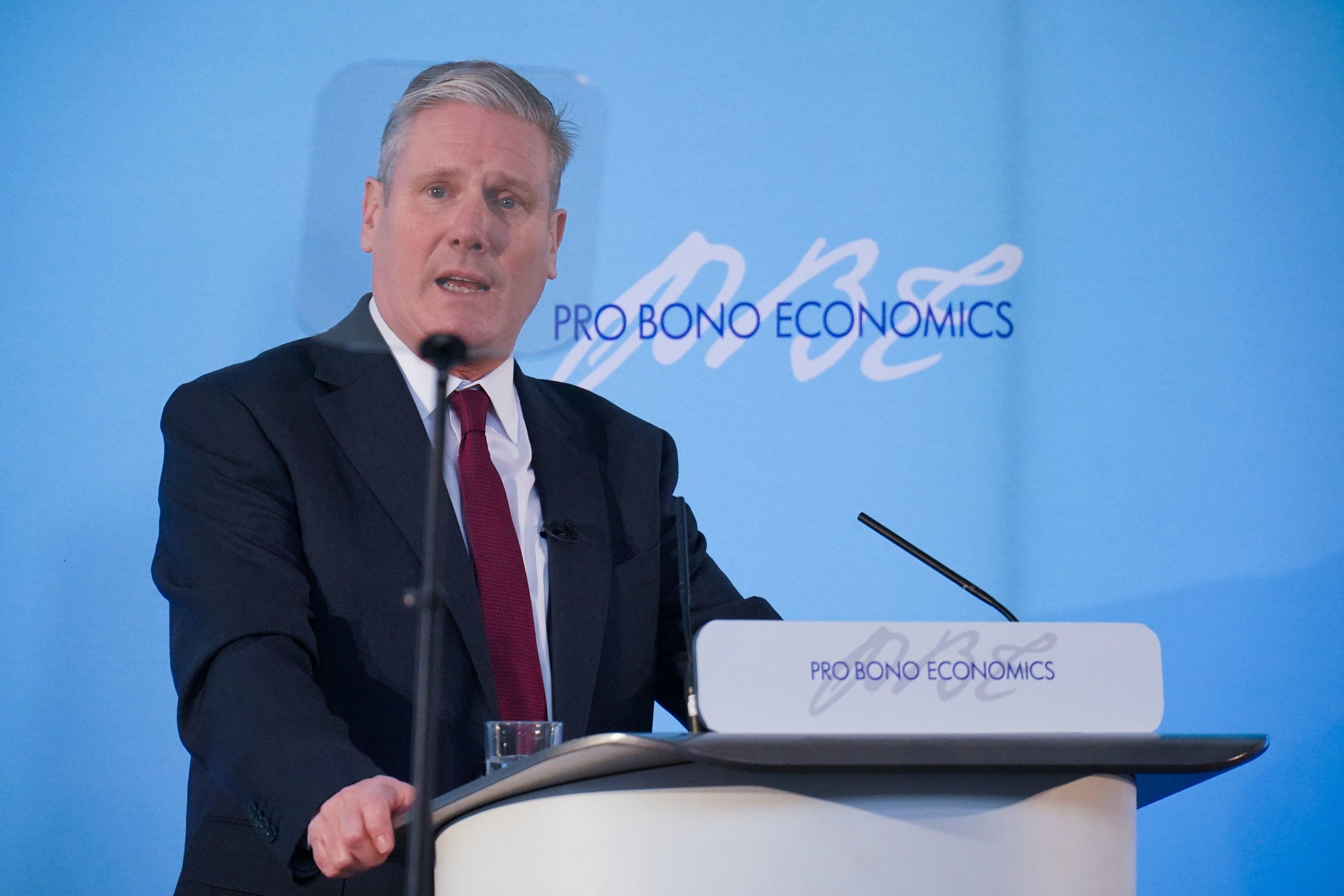Keir Starmer ignites culture war with anti-woke Tories
Labour leader accuses Sunak of stoking division with desperate ‘McCarthyite’ attacks on colonial sensitivity of National Trust – and the RNLI rescuing migrants
Sir Keir Starmer has condemned the Tories’ “McCarthyite” anti-woke attacks on British institutions as he promised to end years of divisive culture wars should he win the next general election.
The Labour leader attacked Rishi Sunak’s party for “waging war” on organisations such as the Royal National Lifeboat Institution (RNLI), the National Trust and the Trussell Trust, saying that Tory “rhetoric has helped demonise them”.
In a rare foray into the issue of so-called culture wars, Sir Keir said the Tories “seem set on sabotaging civil society to save their own skins”. He also called for a reset of the government’s relationship with the charity sector.
It came as culture secretary Lucy Frazer took to the airwaves to launch a fresh attack on the BBC, which she accused of being biased on occasion. Tory MPs have also accused the RNLI and the National Trust, Britain’s largest charity, of pursuing politically correct policies.
In the speech setting out his plans to work with the sector if Labour wins power later this year, Sir Keir told the Civil Society Summit that charities will be essential to his vision for the country: “We will work with you on our mission for a decade of national renewal.”

Taking aim at Mr Sunak’s party, he added: “They’ve got themselves so tangled up in culture wars of their own making, that instead of working with the RNLI, an organisation the late Queen was patron of for 70 years, to find real solutions to stop the small boats, their rhetoric has helped demonise them.
“Instead of working with the National Trust so more people can learn about – and celebrate – our culture and our history, they’ve managed to demean their work.”
He added: “In its desperation to cling onto power at all costs, the Tory Party is undertaking a kind of weird McCarthyism, trying to find woke agendas in the very civic institutions they once regarded with respect.
“Let me tell you. Waging a war on the proud spirit of service in this country isn’t leadership. It’s desperate. It’s divisive. It’s damaging.”
The term McCarthyism originates from the anti-communist witch hunt against the left led by senator Joseph R McCarthy in 1950’s America and is now shorthand all the world over for a political purge.
Senior Tories have accused the National Trust of “going woke” for looking at how its properties have links to slavery and colonialism. Sir Keir said the Tories going to war with the National Trust was “what happens when politics of self-preservation prevail over commitment to service”.

In 2019, the RNLI came in for criticism from Tory MPs and other right-wing figures for its funding of overseas projects to help save people from drowning. In 2021 its chief executive Mark Dowie also revealed that volunteers were being abused for their work rescuing migrants. The press coverage led to a huge rise in donations to the volunteer organisation.
Former Brexit Party leader Nigel Farage previously dubbed the RNLI a “migrant taxi service” for its role in helping asylum seekers in small boats in the English Channel to safety.
Sir Keir’s speech is the first time a party leader had set out a vision for the charity sector since David Cameron’s Big Society plan. The idea was meant to see communities become less dependent on the state for solutions to their problems.
Sir Keir said it was a great idea in principle, but said “when austerity kicked in, we ended up with the poor society”. He added: “Now we need a new vision for a new era.”
Mr Sunak claimed Sir Keir’s speech was an attempt to distract from his record as Labour leader. Richard Holden MP, the Tory chair, attacked Sir Keir’s “vacuous” speech and said it showed “he hasn’t got a plan and continues to snipe from the sidelines”.
No 10 backed the work of the National Trust and RNLI, but stressed that charities needed to operate within the rules. The PM’s official spokesperson said the government “pays tribute to the tireless work of the RNLI and its volunteers who save lives at sea”.
It came as Ms Frazer said she believed the BBC had been biased on occasion, as she defended plans by the media regulator Ofcom to have more powers over the BBC News website.

In an awkward exchange on Sky News, Ms Frazer struggled to give examples. She then pointed to BBC coverage of the bombing of a hospital in Gaza, when an on-air correspondent speculated that the explosion might be caused by an Israeli airstrike. The BBC later apologised for that speculation.
Pushed on the example of the hospital attack, Sky News present Kay Burley said to Ms Frazer: “There’s a difference between mistake and bias, surely?” No 10 was later forced to deny that the Conservative government was pursuing an agenda against the BBC.
Meanwhile, Labour’s shadow culture secretary Thangam Debbonaire backed the idea of teaching children about white privilege – saying it was a good idea.
Asked whether she supported the guide for parents by children’s charity Barnado’s, the frontbencher told BBC Radio 4’s World at One programme: “We need education that allows children the opportunity to question, to ask difficult questions sometimes of our nation’s history.”
Join our commenting forum
Join thought-provoking conversations, follow other Independent readers and see their replies
Comments
Bookmark popover
Removed from bookmarks